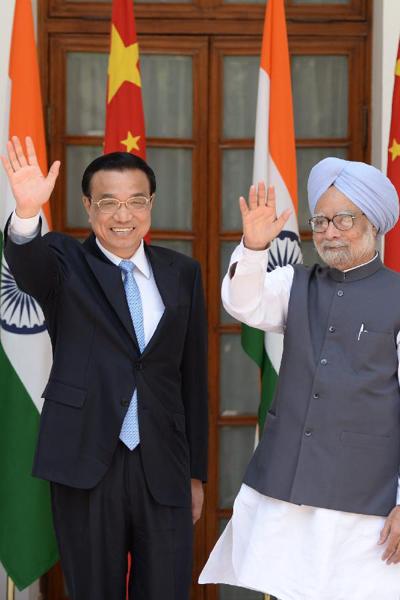
Premier Li Keqiang (L) and Indian Prime Minister Manmohan Singh waves during their meeting in New Delhi, India, May 20, 2013.[Photo by Ma Zhancheng/Xinhua]
NEW DELHI -- Visiting Premier Li Keqiang said on May 20 the most important outcome of his talks with the Indian leaders is that they reached strategic consensus and deepened strategic trust.
Briefing the press after meeting with his Indian counterpart Manmohan Singh, Li said at the talks, held in the night of May 19 and in the morning of May 20 with Singh and other Indian officials, both sides had friendly, in-depth and candid discussions.
Premier Li and Singh have met twice for talks since his arrival in the afternoon of May 19, highlighting the importance the two sides have attached to promoting the strategic and cooperative partnership.
Li told the press that the two sides believe that each country should see the other’s development as a major opportunity for itself.
Amicable relations between China and India will be a positive thing for Asia, and common development of China and India will provide new engines for the world economy, he added.
On the border issue, which is left over by history, Li said the two sides believe they have over time established the principles of settling those questions. And in the meantime, the two sides have worked together to maintain tranquility and peace in the border areas.
“Both sides believe that we need to improve the various border-related mechanisms that we have put into place and make them more efficient, and we need to appropriately manage and resolve our differences,” he added.
“With regard to Indian concerns about trans-border rivers, we have shared hydrological information with the Indian side in recent years, bearing in mind the overall interests of our relationship and acting in the humanitarian spirit,” said the premier.
“And we stand ready to step up communication with the Indian side with regard to the development of water resources and environmental protection,” said Li.
China and India are friendly neighbors, so neither side will do anything that damages the interests of the other side without getting benefits itself, he said.
“Both Prime Minister Singh and I believe that there are far more shared interests between China and India than the differences that we have. And both sides need to draw wisdom from our long history and learn from our respective vast experiences,” Li added.
Singh said in a media statement on May 20 that “I shared with Premier Li my view that the rise of China and India is good for the world and that the world has enough space to accommodate the growth aspirations of both our peoples.”
“We agreed that both sides must work to strengthen greater trust and confidence, which, in turn, will permit much larger cooperation,” he added.
During Li’s visit, China and India issued a joint statement on May 20 highlighting their commitment to expanding common ground in bilateral cooperation and coordination in various fields.
After the India trip, Li will visit Pakistan, Switzerland and Germany.
